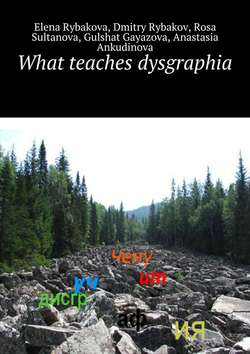Читать книгу What teaches dysgraphia - Elena Rybakova - Страница 2
Introduction
ОглавлениеDomestic and international science has reached significant heights in the study and methodology of problems associated with violations of written communication in both children and adults.
Nosology cal aspects of modern research, etiological, structured, methodical approach s allow Vat effectively ensure social and educational needs of children and adults with dysgraphia, actualizing not only have stored on uchayuschihsya resources, but also adaptive, and overcompensation tional opportunities.
However, the rapid increase in the complexity of both children suffering from violations of written communication and the individual structure of their discompetencies requires the positioning and development of new concepts, approaches and perspectively significant principles for the development of a system of psychological, medical and pedagogical support for children of target groups, adequate to their vital and anticipated special educational needs in the context of a rapidly changing world.
A child with disabilities can not but reflect in his written sphere his worldview, his sense of his place in the external environment and his prospective, probable fate. He often feels more insightful and tense insufficiency, inaccuracies, cunning and conventionality of the observed picture and its verbal-conceptual reflection. Here sometimes lie difficult to determine the factors of pathological nature – and here can be found the key to the organization of compensation, activity, personal, overcompensatory actualization of the child, to ensure the synergies of his self-development.
Not forgetting the need for the formation and development of a child with disabilities in the development of increased resources of social adaptability, social attractiveness, we have no right to neglect either obvious opportunities or more complex, systemic mechanisms.
At the same time, the current, future qualitative transformation of society, contemporary demands of citizens and society can be realized with an innovative approach to the human resource, including – in the format of modern structuring of society, as well as adequate reproduction of human capital. Considering as the last complex relationship with the world and their own capabilities of people with special educational needs, we initiate not only an effective surmounting of Lenie related problems, but also position the formation of social trust, acceptance to a new level, activate the latent potential of self-development of citizens and society, effectively identify perspective promising beginnings of social progress.
On the basis of the department teachers ki Psychology Faculty of the Bashkir State University, the Inter-Regional Interagency Internet – Lounge “White Speech”, the student and research association “Monogorodok” teachers, experts, heads of educational and other institutions of social orientation, students, parents of children with disabilities, will present TV community, collaborating in the social responsible project “High Diploma,” which gather the experience favorable correction of complex disorders, including writing, as well as developed the principle’s efficiency, improve psi and emotional ceiling elements of children in prosess corrective maintenance and innovative approaches of inclusive education.
Modern, responding personal and other needs of a child with disabilities in health possibility, system-activity approach creates conditions for optimization of all parties individualing, all the functional resources of the child – and thus actualize its hidden opportunities and overcompensationtional resources.
Optimum subject- personal actualization, as a rule, reveals a different child, with unexpected opportunities and priorities, prospects and a reflex of the potential.
Accounting for more subtle processes and dependencies related to the complexity of violations and related trends not only increases the efficiency of activities of all participants in the social and educational space and their psych-emotional well-being – it is also promisingly consistent, sets the basis for self-development of correctional-educational processes, social favor and culture positivism in social relations.
At first, the general education sphere comprehended and evaluated both the pathos of correctional education and its productive capabilities. Today we observe how the macrosociety is imbued with the significance and effectiveness of tolerance, the positivist approach in defectological support, as well as with the overcompensation capabilities of special didactics and intersubject modeling of social and educational dialogue.
The authors respectfully ask Repina Zoya Alekseyevna, Yekaterinburg, Russian Federation, to take the dedication of this book as a sign of admiration for her foresight in relation to the publishing fate of Rybakova EV: “Whatever you do, Lena,” she said in the far eighties, – you still get a book.”
